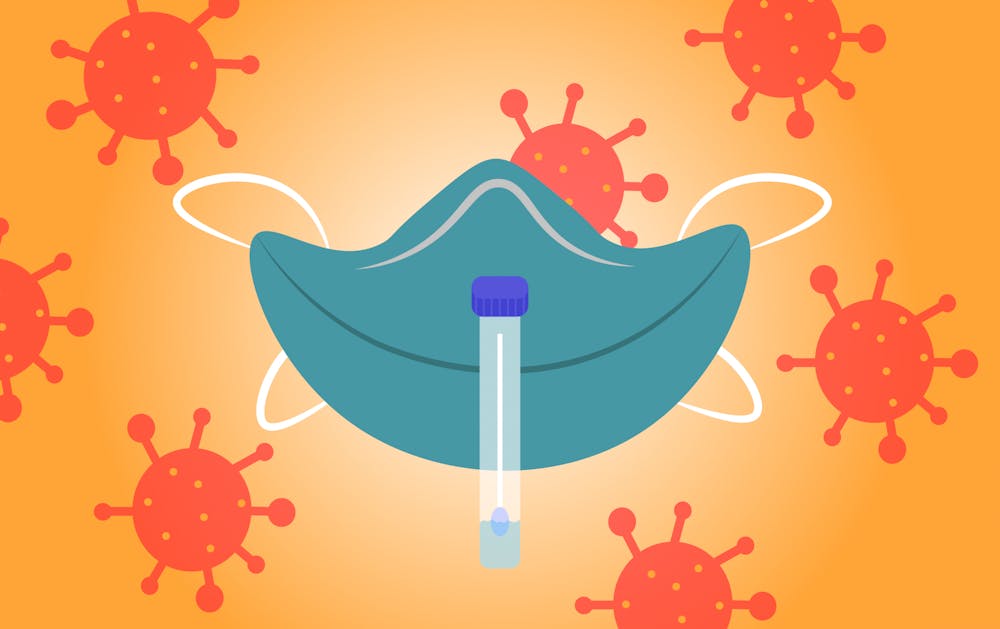ASU's Biodesign Institute researchers have developed a faster and cheaper COVID-19 test based on saliva samples.
The test is done by spitting into a straw and test tube, allowing ASU to test the saliva at its laboratory, said Joshua LaBaer, executive director of the Biodesign Institute.
“We want to be able to test thousands (of people),” LaBaer said. “So we started experimenting with just using a drinking straw and an empty tube and what we found is that that worked perfectly well.”
So far, testing for COVID-19 has largely been based on nasal swabs, which requires a registered nurse fully equipped in personal protection equipment to complete the test, LaBaer said.
“When you put a stick in someone's nose there is a very real chance that they could cough at you, they could sneeze at you and you actually have to get up and close personal to actually put that swab in their nose,” LaBaer said. “So even if they're just talking to you, there's a risk that they're going to get sprayed with the virus.”
Saliva testing can be done independently, meaning nurses are at less risk of being exposed to the coronavirus and the testing process can be done faster, LaBaer said.
To test the new method, samples were collected from ASU testing locations. The researchers were able to collect around 60 tests from individuals using both the nasal swabs and the new saliva method. The samples at the lab revealed that they matched up exactly in all but one test, where the saliva-based test was positive, and the nasal swab test was negative, LaBaer said.
LaBaer attributes that difference to studies showing that the saliva test is a more direct, “sensitive” test due to it having more signals of the virus compared to the nasal swab because it is a direct sample from the mouth, which is the likeliest source for transmission of COVID-19.
ASU will begin to immediately use these new tests with their existing partners, such as utility companies, Circle the City, an organization that provides help for the homeless in Phoenix, and the Navajo Housing Authority, LaBaer said.
The researchers began developing their testing method after Rutgers University announced it had developed a saliva-based test, and was seeking federal approval for the usage of the test at homes, LaBaer said.
Ian Shoemaker, a senior instrumentation engineer at ASU who leads the University’s robotic testing, said testing with saliva required the robots to have new, wider tips and different programming that could successfully get clean samples from the different material to test.
“Aside from getting the sample out of the tube and into a format that we can work with,” Shoemaker said. “Everything else downstream of that is very, very similar. The chemistry is similar, the handling is similar and the extraction process is similar.”
The method developed by Rutgers University has been approved by the Food and Drug Administration, which also approved the testing for any certified laboratories and the FDA confirmed ASU can also begin distributing the saliva-based tests, LaBaer added.
The researchers began trying with a Spectrum Solution kit, a saliva testing kit, but each one costs $10, which is too much if ASU plans to test thousands of people, according to LaBaer. The team began experimenting with just a straw and test tube, which costs just “pennies” in comparison, he said.
“At the very minimum, we are looking to try to roll this out for the university and try to help folks here stay safe when people start coming back to work,” LaBaer said. “Personally, I would like to figure out ways to expand it beyond that, and certainly we will do that with partnerships ... I think the state is going to recognize the value of this testing and they're going to be looking for us to help the way and expand its application.”
Reach the reporter at wmyskow@asu.edu and follow @wmyskow on Twitter.
Like The State Press on Facebook and follow @statepress on Twitter.

Wyatt Myskow is the project manager at The State Press, where he oversees enterprise stories for the publication. He also works at The Arizona Republic, where he covers the cities of Peoria and Surprise.




